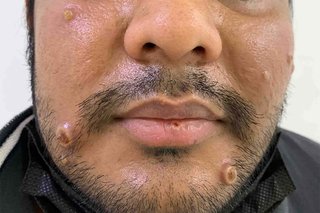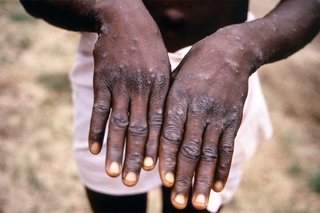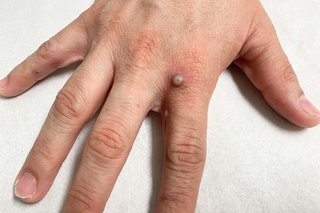Mpox in the UK
There have been a small number of cases of mpox in the UK since 2022. These have mainly been a type of mpox that may be milder (called Clade 2 mpox).
Cases of the type of mpox that may be more serious (called Clade 1 mpox) are very rare in the UK.
So far this type of mpox has mainly been found in countries across central and east Africa.
The risk of catching mpox in the UK is low for most people.
How you get mpox
Mpox can be passed on from person to person through:
- any close physical contact with mpox blisters or scabs (including during sexual contact, kissing, cuddling or holding hands)
- touching clothing, bedding or towels used by someone with mpox
- the coughs or sneezes of a person with mpox when they're close to you
In parts of central and east Africa, mpox can also be caught from infected rodents (such as rats, mice and squirrels) if:
- you're bitten
- you touch their fur, skin, blood, body fluids, spots, blisters or scabs
- you eat their meat and it has not been cooked thoroughly
Symptoms of mpox
If you get infected with mpox, it usually takes between 5 and 21 days for the first symptoms to appear.
The first symptoms of mpox include:
- a high temperature (fever)
- a headache
- muscle aches
- backache
- swollen glands
- shivering (chills)
- exhaustion
- joint pain
A rash usually appears 1 to 5 days after the first symptoms. It can be on any part of the body, including the palms of the hands, soles of the feet, mouth, genitals and anus.
You may also have anal pain or bleeding from your bottom.
The rash is sometimes confused with chickenpox. It starts as raised spots, which turn into sores (ulcers) or small blisters filled with fluid. The blisters eventually form scabs which later fall off.
The symptoms usually clear up in a few weeks. While you have symptoms, you can pass mpox on to other people.



Urgent advice: Call NHS 111 if:
- you have a rash with blisters or sores (ulcers) and you've been to central or east Africa in the past 3 weeks
- you have a rash with blisters or sores (ulcers) and you've been in close contact (including sexual contact) with someone who has symptoms of mpox and they've been to central or east Africa in the past 3 weeks
- you have any other symptoms of mpox and you've been to central or east Africa in the past 3 weeks and had close contact with someone who had symptoms of mpox
Stay at home and avoid close contact with other people, including sharing towels or bedding, until you've been told what to do.
Tell the person you speak to about your recent travel history.
Non-urgent advice: Call a sexual health clinic if:
You have a rash with blisters or sores (ulcers) and have either:
- had 1 or more new sexual partners in the past 3 weeks
- had sex or sexual contact with someone who has symptoms of mpox but has not been to central or east Africa in the past 3 weeks
Stay at home and avoid close contact with other people, including sharing towels or bedding, until you've been told what to do.
Call the clinic before visiting. Tell the person you speak to if you've had close contact with someone who has or might have mpox.
Stay at home and call 111 for advice if you're not able to contact a sexual health clinic.
Other rashes
NHS 111 can tell you what to do if you have a rash but:
- you have not been in close contact with someone who has or might have mpox
- you have not been to central or east Africa recently
Treatment for mpox
Mpox is usually mild and can get better within a few weeks without treatment.
But if your symptoms are more severe and you become unwell, you will need treatment in hospital.
The risk of needing treatment in hospital is higher for:
- older people
- young children
- people with a condition or who are taking a medicine that affects their immune system
Because the infection can be passed on through close contact, it's important to isolate if you're told to do so.
GOV.UK has further advice for people infected with mpox who are isolating at home
Vaccination to protect against mpox
Mpox is caused by an infection with the mpox virus. The mpox vaccine can give good protection against mpox.
Who can have the mpox vaccine
The NHS is offering the mpox vaccine to people who are at increased risk of catching mpox.
You may be able to have the mpox vaccine if:
- you're a man who has sex with other men and you have multiple partners, participate in group sex or attend sex-on-premises venues (staff at these venues may also be eligible)
- you've had contact with someone who has mpox
If you've had contact with someone who has mpox, the contact tracing team should contact you. They will check your risk of catching mpox and tell you if you need to have an mpox vaccine.
How the mpox vaccine is given
The mpox vaccine is given as an injection.
Most people will be offered 2 doses of the vaccine at least 1 month apart. Some people only need 1 dose of the mpox vaccine.
How to get the mpox vaccine
If you're eligible for the mpox vaccine, you can find an mpox vaccination site
The healthcare professional at your appointment will check if you're eligible.
If you've been offered an mpox vaccine because you've had contact with someone who has mpox, you do not need to find an mpox vaccination site. The mpox contact tracing team should tell you where to get vaccinated.
Things you can do to avoid getting and passing on mpox
Although mpox is rare, there are things you can do to reduce your chance of getting it and passing it on.
Do
-
wash your hands with soap and water regularly or use an alcohol-based hand sanitiser
-
look out for any possible symptoms of mpox for 3 weeks after returning from central or east Africa
-
talk to sexual partners about their sexual health and any symptoms they may have
-
be aware of the symptoms of mpox if you're sexually active, especially if you have new sexual partners
-
take a break from sex and intimate contact if you have symptoms of mpox until you're seen by a doctor and are told you cannot pass it on
Don’t
-
do not share bedding or towels with people who may have mpox
-
do not have close contact (within 1 metre) with people who may have mpox
-
do not go near wild or stray animals, including animals that appear unwell or are dead, while travelling in central or east Africa
-
do not eat or touch meat from wild animals while travelling in central or east Africa
More information
Page last reviewed: 01 November 2024
Next review due: 25 April 2025